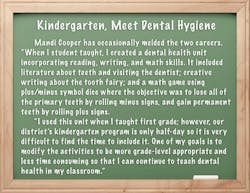Teacher explains how the operatory experience helps with her free-for-all pupils
by Cathy Hester Seckman, RDH
Kindergarten teacher Mandi Cooper of Philadelphia likes to surprise her kids once in a while. "They're usually so impressed when they tell me they have a loose tooth or have lost a tooth, and I can tell them exactly which one it is, or guess exactly how many teeth they've lost so far. They're always shocked, and ask,
'How did you know?'"
It's easy for her, because Mandi is not only a working teacher; she's also a working dental hygienist.
When Mandi entered hygiene school in 1998, it was her second choice. "I was interested in teaching," she remembers, "but was cautioned in high school about the job market being oversaturated. My aunt is a hygienist, and my grandfather suggested considering dental hygiene as a career. I decided to look into it."
She found a job as a dental assistant while still in high school and discovered that she enjoyed the field. "I went to Montgomery County Community College in Blue Bell, Pa., for an associate degree in dental hygiene in 2000." She also earned an associate degree in elementary education.
Her first hygiene jobs were in general practice, both as an employee and as a temp. "I really enjoyed hygiene, although I found transitioning from school to private practice difficult; going from 3-plus hours per patient to 40-60-minute appointments! I love getting to know people, and especially enjoy working with dental-phobic patients to help them overcome their fears and become comfortable with dentistry."
What about education, though? It had been her first choice, after all, and now she had a flexible career and could afford to indulge herself. She would still need student loans, but the well-paying hygiene jobs, she says, "were a huge help. I knew I wanted to get my bachelor's degree. I initially began a health-care degree completion program, but decided not to continue with it because I wanted to expand my options. Education was the right fit for a number of reasons — I love the creative side of teaching, I love children, and I would have the option of meshing the two careers if I ever chose to do so."
She worked as a hygienist evenings and Saturdays while she earned a bachelor's degree in elementary education from Arcadia University in 2004. She has also completed a master's degree in Instruction and Curriculum at Gratz College in Melrose Park, Pa., in 2010, and is accumulating post-master's credits to advance her teaching career and salary.
With education degrees in hand, Mandi gave up hygiene temporarily, but had no intention of abandoning her first career. "I did not work in hygiene during my first year teaching. It was so overwhelming being a first-year teacher that I had no spare time, plus I was planning my wedding, which left me with even less time. Other than that one year, I have always done both."
She currently teaches kindergarten in a suburban school district near Philadelphia. "It's time-consuming and keeps me on my toes, but I love it. My experience in dental hygiene helped me become a better communicator, learn how to manage my time, and make connections with other teachers/administrators in several school districts. It has also helped me develop interpersonal skills, since you meet all types of people while doing hygiene."
Mandi is also a hygienist in the office of Barbara Urbano, a general dentist in Eagleville, Pa. "I work there Saturdays during the school year and more often during the summer. I also temp in a couple of offices during the summer as well. The extra income is beneficial, and I enjoy keeping busy all year."
-----------------------------------------------------------
Other recent articles by Cathy Seckman
-----------------------------------------------------------
Sounds like an impossible working life, doesn't it? How can a hygienist, with her mind on schedules and small, meticulous tasks, also work in the free-for-all environment of a kindergarten classroom?
"I don't find it difficult to switch gears at all," Mandi insists. "It's like changing hats. I work in an office that is very understanding and supportive of my teaching career, so that certainly helps. I get funny looks from patients at times when I mention that I am a teacher (and I usually have to assure them that I truly am a licensed hygienist as well!).
"As far as it being too much to handle, I've been going to school and working more than one job since I was 16, so I think I am pretty much used to life moving at a certain pace. I do find it challenging to get continuing education credits in, though. I'm still taking graduate courses for education and those are usually on weekends. So between grad classes, working on Saturdays, and other commitments, it's hard to find courses that fit my schedule. I also have to really make an effort to stay up to date on what's going on in the dental world since I practice so little during the school year. I read publications and take online CE courses to keep current."
Besides differences in practice, the two jobs have little in common when it comes to benefits. "They are extremely different! Teaching has wonderful benefits — health care, a consistent salary, pension, paid sick time. Unfortunately, most hygiene positions in my area lack these benefits, especially for part-time employees. The pay is also less predictable; some weeks are busier than others and, because most offices pay an hourly rate, your pay is dependent upon your schedule being filled.
"I am very fortunate to have the financial and job security that my teaching career provides. I think it would be challenging if I did hygiene full-time. Hygiene pays well, but I would be spending a lot more out of pocket for health insurance and retirement planning. The one benefit of hygiene over teaching is the amount of time spent working outside of your scheduled hours. When I leave the dental office, I am able to leave work at work and not bring anything home with me. When I leave school, I usually leave knowing I have to do lesson plans, answer parent emails, mark papers, etc. on my own time."
You might think Mandi doesn't have much of a personal life, but she and her husband of eight years, Norm, actually have an infant at home. "Our 10-month-old, Chase, keeps me running after him at home, and we also have a sweet boxer named Sadie who is usually the one that Chase is chasing after. I love spending time with family and friends, vacationing at the beach, and am notorious for picking up hobbies and never completing them. I'll knit a quarter of a blanket, or start scrapbooks and never finish them."
In the future, Mandi expects to continue teaching full-time. She would also like to expand her hygiene career. "I would love to add an evening during the week; however, most offices in my area are not open that late. The laws regarding supervision by a dentist have changed in Pennsylvania just within the last couple of years. I believe hygienists are now allowed to see certain patients without a dentist being on site; however, most offices still only see patients while the dentist is present. I would love for more offices to allow hygienists to see patients well into the evenings since this would help patients who work full-time and would allow me to gain more hygiene hours."
There's something to be said for following one's passions instead of following the crowd. It isn't typical, in these days of uncertain jobs, to flit from one profession to another, but Mandi Cooper has made it work for her; most importantly, she loves both of her very concurrent careers. RDH
CATHY HESTER SECKMAN, RDH, has written on dental topics for 26 years. She speaks on pediatric issues, and works clinically in a pediatric practice. She is also an indexer and a novelist.
Past RDH Issues








